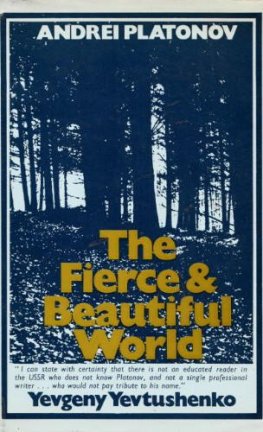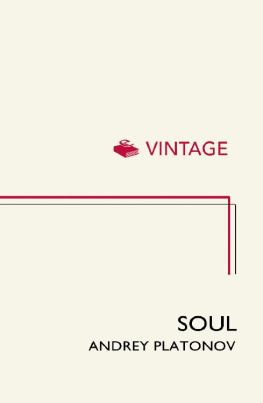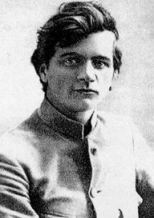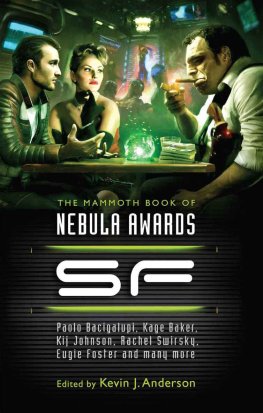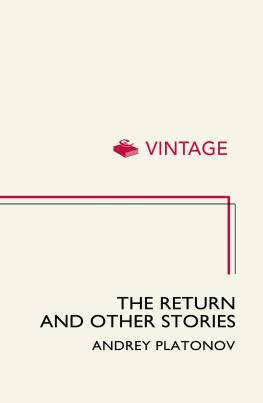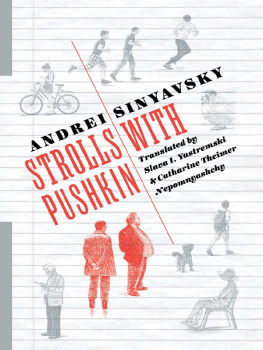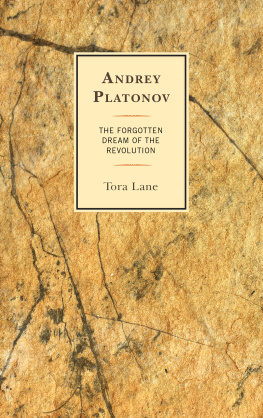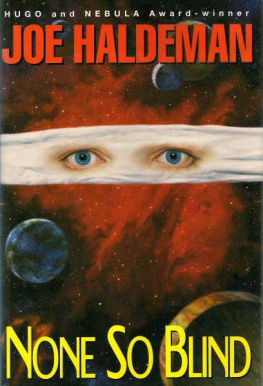Andrei Platonov - The Fierce and Beautiful World
Here you can read online Andrei Platonov - The Fierce and Beautiful World full text of the book (entire story) in english for free. Download pdf and epub, get meaning, cover and reviews about this ebook. year: 2013, publisher: Feedbooks, genre: Art. Description of the work, (preface) as well as reviews are available. Best literature library LitArk.com created for fans of good reading and offers a wide selection of genres:
Romance novel
Science fiction
Adventure
Detective
Science
History
Home and family
Prose
Art
Politics
Computer
Non-fiction
Religion
Business
Children
Humor
Choose a favorite category and find really read worthwhile books. Enjoy immersion in the world of imagination, feel the emotions of the characters or learn something new for yourself, make an fascinating discovery.
- Book:The Fierce and Beautiful World
- Author:
- Publisher:Feedbooks
- Genre:
- Year:2013
- Rating:3 / 5
- Favourites:Add to favourites
- Your mark:
- 60
- 1
- 2
- 3
- 4
- 5
The Fierce and Beautiful World: summary, description and annotation
We offer to read an annotation, description, summary or preface (depends on what the author of the book "The Fierce and Beautiful World" wrote himself). If you haven't found the necessary information about the book — write in the comments, we will try to find it.
The Fierce and Beautiful World — read online for free the complete book (whole text) full work
Below is the text of the book, divided by pages. System saving the place of the last page read, allows you to conveniently read the book "The Fierce and Beautiful World" online for free, without having to search again every time where you left off. Put a bookmark, and you can go to the page where you finished reading at any time.
Font size:
Interval:
Bookmark:
Andrei Platonov
THE FIERCE AND BEAUTIFUL WORLD
Stories
Translated by John Barnes
Introduction
Without Me, the Countrys Not Complete
ANDREI PLATONOVS face, looking out from one of his last photographs, is the face of a tired Russian worker. It has not a truce of affectation, no hint of what is called artistic temperament, no monumental profundity, no oracular brilliance in the eyes.
People with faces like this do not like eloquence. They prefer the painstaking study of the intricate mechanics of living, and before believing something, they want to feel it all over with their hands.
Its the face of a worker who thinksthe face of a master.
The prose Platonov wrote has just this kind of face.
Not long before the Second World War, a short story called The Third Son by this Russian writer Platonov, who was almost unknown in the West, fell into the hands of Ernest Hemingway, who was already famous. At a meeting with some Soviet journalists, Hemingway spoke with admiration of the pithiness and the expressiveness of Platonovs style. (Hemingway did not know that Platonov had written a brilliant article about his novels To Have and Have Not and A Farewell to Arms.) To their shame, by no means all of the journalists taking part in this conversation with Hemingway knew the work of their compatriot. Platonov was not spoiled by fame during his life, either at home or abroad. He belongs among the delayed-action writers, whose talent is like a safety fuse which runs many years in length. This fuse smolders unseen but persistent, staying dry even under the drizzle of time, until finally a blinding explosion destroys bridges that had seemed built for eternity.
Platonovs talent was noticed by Gorky, Fadeyev and Sholokhov, who had both official critical recognition and wide readership, admired his talent in spite of many differences of their own with the direction in which he was moving. They understood very clearly that somewhere far from the center of the literary stage, which was flooded by the colored lights of countless fireworks, there burned the quiet but steady candle of a remarkable master. And away from those colored lights, with death sentences shining inside them like white crosses on the doors of Huguenots, they both moved hat in hand towards this independent, proud candle.
Platonovs destiny did not work out as theirs did, and while these writers were in the center of the public eye, Platonov was, as it were, on its very edges.
But the literature of any people is always a big city. Only the superficial judge the real spirit of a city by its well-known avenues and its public squares, obligingly advertised by the tourist agencies. For old residents and thoughtful visitors, a city reveals itself most often in the outskirts where the tourist buses do not go. There, away from the noise and the congestion inside the city limits, you can feel the citys enduring quality. The outskirts reveal the true meaning of the center more than the center shows the meaning of the outskirts. The coarse, sorrowing life of the outskirts is always more open, more revealing, than monuments or many-storied piles of glass and steel.
This was Andrei Platonovs kind of street in the city of Russian literature.
It is like the streets of his childhood.
This is what he wrote about himself:
I was born in 1899 in a settlement called Yamskaya, not far from Voronezh. Even ten years ago there was hardly any difference between Yamskaya and the country. I loved the country, too, enough to cry for it although I have not seen it since I was twelve. There were wattle fences in Yamskaya, and kitchen gardens, and vacant land filled with burdocks, huts instead of houses, chickens, shoemakers, and a great many peasants walking along the Zadonsk highway. The bell in the church was all the music there was in the settlement; in the evenings it was listened to with deep feelings by the old folks, by beggars, and by me. On holidayseven the least important onesfurious battles were arranged with Chizhevka or with Troitskayaalso outlying settlements. Men fought to the death, in a kind of ecstasy of violence, or until someone yelled out: Give him air! This meant someone had got hit over his heart or his liver, and he would be shaking all over, white and dying, until the crowd parted around him to let the wind and the cool come in. And then the fight would go on again.
Then I learned to write in school. After that I started work. I worked in a lot of places, and for a lot of bosses. At one time there were ten in our family, and I was the oldest sonthe only worker except for my father. My father was a metalworker, and he couldnt feed a horde like that. I forgot to say that besides the fields, the countryside, my mother, and the sound of bells ringing, I also lovedand the longer I live the more I lovesteam engines, machines, shrill whistles, and sweaty work. I believed then that everything is man-made and nothing comes by itself; for a long time I thought they made children somewhere at the factory instead of by mothers producing them from their stomachs.
There is some kind of link, some kinship, among burdocks and beggars, singing in the fields, electricity, a locomotive and its whistle, and earthquakesthere is the same birthmark on all of them and on some other things, too. Just what it is, I dont know yet, but I do know that if a man whos nothing but a wretched plowman should sit down tomorrow in a big locomotive and handle its controls, he will master it so well that you wont recognize him. Growing grass and working steam engines take the same kind of mechanics
Platonov wrote this in a letter to one of the editors of his first collection of poetry, The Blue Deep, which was published in Krasnodar in 1922 in an edition of 800 copies. It was a remarkably weak collection, and Platonovs poetic talent was shown with much greater strength in the short prose passages quoted in the foreword than in the poems themselves.
It is obvious that he felt this himself, and he stopped writing prose in poetic rhythms and started to write prose as a kind of poetry without rhythm. Some writers dont pay enough attention to the wordfor them what is most important is to state their subject, no matter how awkward, how untidy, that statement may be. Others nurse every line, licking it over and over again. For a few writersand Platonov belongs among themthere is an organic confluence of the poetry of words with the psychological development of the narrative.
He was not a believer in words for their own sake, but at the same time he clearly understood that a message is conveyed not only by the manipulation of its subject but also by the manipulation of the words. Just as we can be attracted by an inherent irregularity in the face of someone we love, in the same way we are charmed in Platonov by the amazingly plastic errors he committed against refined language. There is no question that he worked out his own special, Platonov vocabulary, drawn from folklore and from the living talk of simple people.
She hadnt been able to stand living for very long is the way he talks about an old woman dying.
Theres no point in your wanting a sour cranberry if you cant pucker your face, a gypsy says angrily to a man who has turned her down. Or: The wind pulled at Pukhov like the living arms of some big, strange body, opening its innocence to the wanderer but not surrendering it, and Pukhov shouted with his blood from such happiness.
But Platonov achieved his most surprising results when he skillfully showed the crazy invasion of political phrases and neo-bureaucratic words into the constructions of peasant speech.
Chepurny read that the Soviet authorities were granting to the bourgeoisie the whole endless sky, equipped with stars and other heavenly bodies needed to organize eternal bliss; as far as the earth was concerned, its fundamental structures and essentials for living, these were to stay down belowin exchange for heavenentirely in the hands of the proletariat and the laboring peasantry. At the end of the proclamation the date was set for the Second Coming, which would lead the bourgeoisie in an organized and painless way into the world to come.
Font size:
Interval:
Bookmark:
Similar books «The Fierce and Beautiful World»
Look at similar books to The Fierce and Beautiful World. We have selected literature similar in name and meaning in the hope of providing readers with more options to find new, interesting, not yet read works.
Discussion, reviews of the book The Fierce and Beautiful World and just readers' own opinions. Leave your comments, write what you think about the work, its meaning or the main characters. Specify what exactly you liked and what you didn't like, and why you think so.

